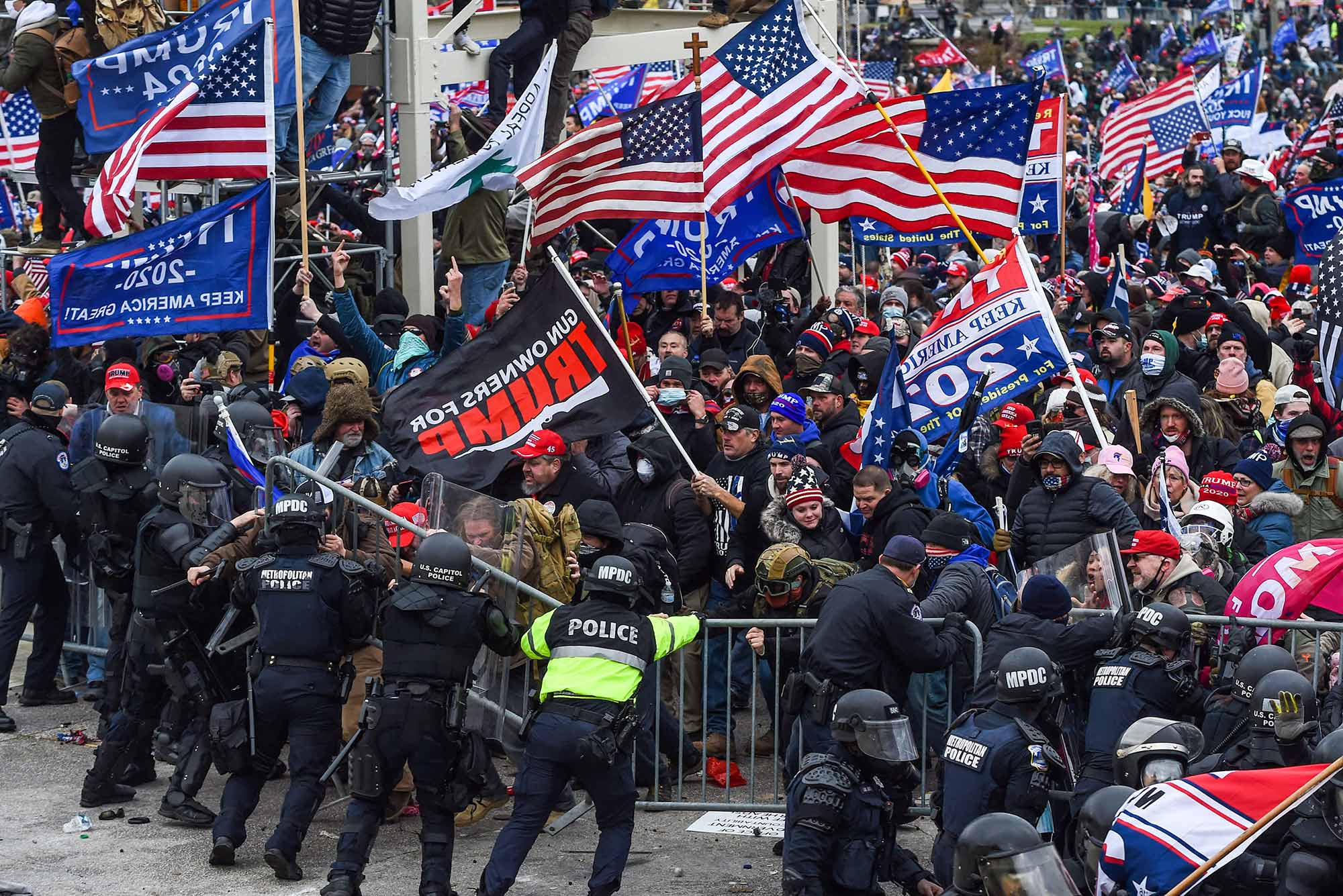As Trump Supporters Storm Capitol, BU Historian Answers: How Worried Should Americans Be?

Trump supporters clash with police and security forces as they storm the US Capitol in Washington, D.C., on January 6. Demonstrators breached security and entered the Capitol as Congress debated the 2020 presidential election Electoral Vote certification. Photo by Roberto Schmidt/AFP via Getty Images
As Trump Supporters Storm Capitol, BU Historian Answers: How Worried Should Americans Be?
CAS’s Bruce Schulman says Wednesday’s attack probably doesn’t qualify as a coup attempt, but you can call it an “insurrection”
Rioters scaling walls, breaking windows, overrunning the US Capitol. Congress rushed out of the House and Senate chambers. The business of certifying a presidential election interrupted. An outgoing president fanning the flames of insurrection.
Wednesday’s terrible events in Washington, D.C., were “an antidemocratic attack on the US government,” says 20th-century US history scholar Bruce J. Schulman, William E. Huntington Professor of History in the College of Arts & Sciences. And the danger probably isn’t over, he warns. Even with the inauguration of President-elect Joe Biden just two weeks away, history’s opinion of President Trump won’t change because of the events in his final days in office, Schulman says.
Q&A
With Bruce J. Schulman
BU Today: How worried should Americans be about the chaos that erupted today in Washington and the effort to interrupt the democratic process?
Bruce J. Schulman: I think extremely worried. It’s hard to think of a similar example of civil unrest in the nation’s capital that has postponed and threatened to interrupt the democratic process and that doesn’t involve a foreign attack on the United States. I guess the closest example would be in the Civil War, when Washington was under threat from rebel troops and there had to be security measures taken. Of course, there have been many, many protests at the site of the events today, and some incidents of violence. But never before have they disturbed the fundamental operation of the constitutional system.
BU Today: President-elect Biden said Wednesday our democracy is under assault. As one CNN commentator asked, is this the end of something or the beginning of something?
Bruce J. Schulman: Historians are notoriously bad predictors of the future. We can’t even agree about what has already happened. My guess is more that we are in the middle of something, that what we’re seeing here is, if not the culmination, a culmination of some long-term trends in American politics. I don’t think you’re going to put this toothpaste back in the tube very easily anytime soon. I would imagine that we’re going to see these kinds of civil disturbances over the next few years. Is it going to be the beginning of a change, in that the people who have supported, enabled, and winked their eyes at some of this behavior, because they found it politically advantageous, will now reconsider? I don’t know. But my guess is that we are more in the middle than at a beginning or an end.

BU Today: How will history judge the performance of the president today, from inciting his rally-goers by saying he will “never concede,” to instructing them to march to the Capitol, to his taped statement telling them to go home—while also saying “we love you”?
Bruce J. Schulman: I imagine that historians will condemn it. I can’t imagine that Trump will not end up among the very bottom ranking of American presidents. And while I imagine that people looking back will judge his performance today harshly, it won’t change the assessment of President Trump, because it’s very much consistent with the way he has behaved his entire presidency and to some extent his entire career. What he did today was no change from what he’s been saying for the last few months. It really is an example of the fulfillment of what he has been asking for, so I think he certainly bears a great degree of responsibility for what happened at the Capitol today, which his own vice president, I think, accurately described as an attack on the Capitol.
BU Today: By a historian’s definition, is this a coup?
Bruce J. Schulman: A better term might be a putsch, to use the term for the Nazis’ rise to power before World War II. My guess is that, if a coup involves a degree of coordination and planning, and a coup also involves a set of actors with a clear agenda for how they want to seize power, then it probably isn’t a coup. We don’t know. We’ll find out more about what was behind today, and whether there was organization and coordination, and whether there was an endgame in sight more than being disruptive. Certainly it was an antidemocratic attack on the US government. I think you could describe it as an insurrection. But a coup usually has to be organized, centrally directed, and have a clear plan for how you seize and maintain power—and I’m not sure that any of the people behind this fit that description.
BU Today: Maybe that’s lucky?
Bruce J. Schulman: To some extent, if there’s any blessing in this, it’s that there’s a lack of competence, as well as a lack of commitment to democratic values. If we dodge this one, it will be because of that.

Comments & Discussion
Boston University moderates comments to facilitate an informed, substantive, civil conversation. Abusive, profane, self-promotional, misleading, incoherent or off-topic comments will be rejected. Moderators are staffed during regular business hours (EST) and can only accept comments written in English. Statistics or facts must include a citation or a link to the citation.